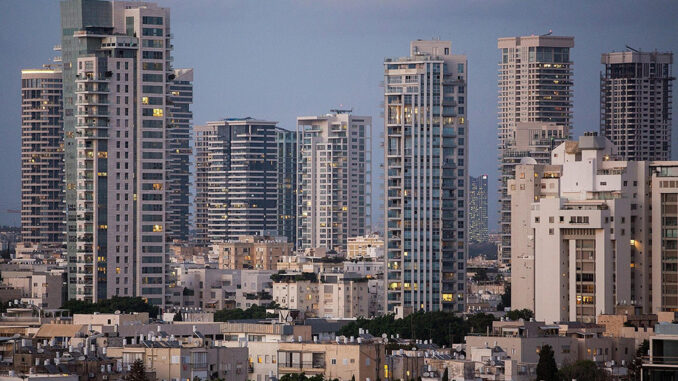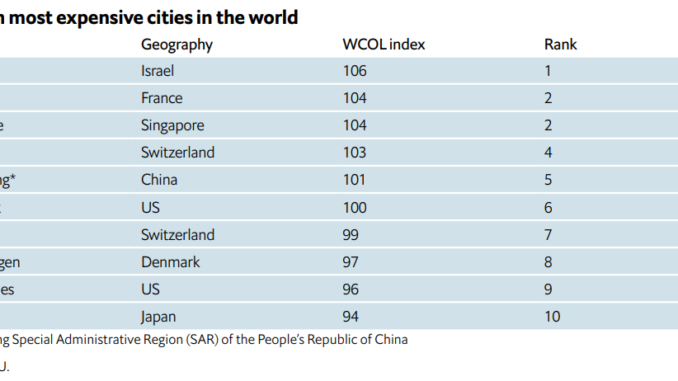
Israel has found itself at the undesirable pinnacle of a list it would rather not be on — that of developed countries with the highest cost of living. This revelation emerged from data released on Sunday by the Organization for Economic Cooperation and Development (OECD), as was reported on the Yeshiva World web site. The comparative index, which delves into general price disparities among countries using consumer price indices and purchasing power parity ratios, pointed out that Israel’s prices were a staggering 38 percent higher than the average for OECD member countries, the report added. Switzerland trailed closely behind in second place, followed by Iceland and the United States in the third and fourth positions respectively.
Unlike other global markets, Israel’s economy demonstrates an unusual concentration in specific sectors, particularly food and household goods. A State Comptroller report highlighted that from 2015 to 2020, the combined market share of the ten largest suppliers in the food and consumer products industries averaged around 54 percent, according to the report on YWN. Additionally, a solitary supplier held approximately 12 percent control over the entire food industry market in 2020.
The impact of this unique market structure becomes starkly evident in the elevated costs of essential consumer goods, such as milk, bread, and cheese. The YWN report said that Israeli prices for these items exhibit a substantial 50 to 70 percent disparity compared to the average prices in OECD member countries.
In response to the data presented by the OECD, Ron Tomer, the head of the Israel Association of Manufacturers, pinpointed the underlying structural issues contributing to Israel’s high price levels, the YWN report indicated. Tomer pointed to foreign exchange rates as a pivotal factor, alongside housing costs, high VAT on food products, limited agricultural support, and extensive regulatory burdens. “Housing prices, the high VAT rate on food, and the lack of direct support for agriculture, and heavy regulation drive prices up,” said Tomer. “The Israeli food industry must be supported and encouraged along with an immediate VAT reduction on food products to the level accepted in Europe.”<
>
<
>
<
>
Recent months have seen the Israeli government, led by Prime Minister Benjamin Netanyahu, face criticism for seemingly prioritizing judicial reform over addressing the escalating cost of living prices. In a move to tackle the issue, the government established a ministerial committee in June, headed by Netanyahu himself, to confront the high cost of living, according to the YWN report. Comprising 13 ministers overseeing a range of ministries including finance, economy, and agriculture, the committee aims to address the pressing concern.

The Israeli populace is grappling with the challenge of mounting living costs, compounded by trimmed economic growth forecasts and global economic slowdowns. Simultaneously, the rise in interest rates has led to increased expenses in mortgages and loans, the YWN report added.
Earlier this year, a survey conducted by the Israel Democracy Institute underlined the public’s anxiety surrounding the high cost of living. The survey revealed that a majority of respondents attributed the issue to government inaction, with food prices ranking as the most significant concern for two-thirds of those surveyed, the report said. Housing costs and indirect taxation were also highlighted as notable sources of worry.
Notably, the survey found that a minority of respondents attributed the high cost of living to large monopolies, local manufacturers, importers, or supermarket chains.
As Israel grapples with the implications of its high cost of living, it remains to be seen how the government’s efforts to address this issue will unfold and whether tangible solutions can be implemented to alleviate the financial burdens faced by its citizens.
In December 2021, NBC News reported that Tel Aviv, the vibrant Mediterranean metropolis of Israel, has claimed the unenviable title of the most expensive city in the world, as was revealed by the 2021 “Worldwide Cost of Living” report, that was released by the Economist Intelligence Unit. This meteoric rise to the pinnacle came after Tel Aviv secured the fifth spot in 2020, surpassing the likes of Paris and Singapore, which shared the second place, as was reported by NBC News. New York, the leading American city on the list, took the sixth position in 2021, followed by Hong Kong and Zurich. Los Angeles and Osaka were the other two American cities in the top 10 in 2021,securing the ninth and tenth spots respectively.
The strength of Israel’s currency, the shekel, when converted into dollars, played a significant role in propelling Tel Aviv to the forefront of the list, the report highlighted. NBC News reported that prices in shekel terms surged around 1.6 percent, driven by increases in groceries, household goods, cars, and fuel. Additionally, the city held the distinction of being the second-most expensive place to purchase alcohol.
Although property prices were not factored into the report, it acknowledged the notable rise in real estate prices in Tel Aviv, particularly in residential areas, according to the NBC News report in 2021. Oren Kessler, a political analyst and author who relocated to Tel Aviv from Washington, D.C. in 2019, emphasized the strain that property costs were putting on the local population. Comparing prices between Tel Aviv and Washington, he noted that despite the similarity in costs, salaries in Tel Aviv did not match up, the NBC report said. Kessler remarked on the allure of Tel Aviv, a city many Israelis aspire to spend time in, making it a magnet for residents despite its high costs.
The report unveiled that the inflation rate for 2021 across cities marked the fastest increase in the past five years at 3.5 percent. The surge was propelled by rising transportation costs, along with the expenses related to recreation, tobacco, and personal care, as was noted in the NBC News report. In comparison, inflation recorded an increase of 1.9 percent in 2020 and 2.8 percent in 2019.
In stark contrast to Tel Aviv’s ranking in 2021, the war-torn city of Damascus, located just over 130 miles away, was declared the world’s cheapest city, NBC News reported. The report attributed this distinction to the economic struggles faced by Syria. Tripoli in Libya, Tashkent in Uzbekistan, Tunis in Tunisia, and Almaty in Kazakhstan rounded out the list of the world’s top five cheapest cities.
In March of 2022, the Chinese based Xinhua news agency reported that the key factor driving Tel Aviv’s ranking is the appreciation of the Israeli currency, the new shekel, against the U.S. dollar, which has led to higher local costs. This rise in the exchange rate of the new shekel against the U.S. dollar has been significant, reaching its highest level since 1995. While the exchange rate later dipped, it remained higher than the levels observed between 2018 and 2020, Xinhua reported.
The report explains that the high value of the new shekel is a result of its elevated demand compared to its supply. Israel’s strong current-account surplus, its attractiveness to foreign technology investors, and its solid fundamentals are all contributing factors that are helping to maintain the strength of the new shekel.
The influx of Israeli capital due to acquisitions of companies, especially in the technology sector, has led to an increased demand for shekels, according to the 2022 Xinhua report. Additionally, Israel’s robust economic growth of 7 percent in 2021 and its successful COVID-19 vaccine rollout contributed to the acceleration of its economic recovery. The country’s exports also surged to a record high of $140 billion in 2021, with the high-tech sector playing a pivotal role, as was reported by Xinhua.
CONTINUE<
>



Leave a Reply
You must be logged in to post a comment.